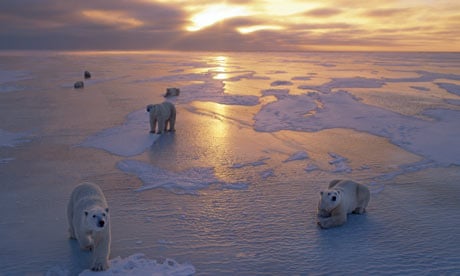The Obama administration today declined to protect polar bears from the single greatest threat to their survival – the melting of sea ice by global warming. The decision brought immediate protests from wildlife and environmental groups.
The interior secretary, Ken Salazar, said he would not overturn one of the most controversial last-minute rules of the George Bush era. The rule had denied protection to the polar bear because Bush did not want to be pressed into regulating the industries that emit greenhouse gases.
"To see the polar bear habitat melting and an iconic species threatened is a tragedy of the modern age," Salazar said. But he said existing wildlife legislation, which was crafted in the 1970s, was not equipped to deal with threats to the polar bear from heat-trapping pollution occurring miles away from its Arctic home. "The endangered species act is not the best mechanism for cutting down on climate change."
He said it would be far more effective to work towards a comprehensive strategy on climate change – which he said the Obama administration and Congress were pursuing as their "signature" issue. "We need a comprehensive energy and climate change strategy that curbs climate change and its impact, including the loss of sea ice," he said.
However, the rationale that it was better to drop the protections under the endangered species act rather than use an imperfect body of law will carry very little weight among environmentalists who have led a dogged campaign to press Obama to overturn the Bush rule.
Salazar's announcement also contradicts the logic of a decision last month that clean air legislation, of similar 1970s vintage to the endangered species act, compelled the Environmental Protection Agency to regulate carbon emissions as a dangerous pollutant.
In his brief remarks to reporters, Salazar acknowledged that climate change was the biggest threat to the animal. "The single greatest threat to polar bear is the melting of Arctic ice caused by climate change."
There are estimated to be 20,000-25,000 polar bears living in the wild.
The decision is easily among the most unpopular to date among environmentalists, and Salazar acknowledged that the administration could face a legal challenge. Greepeace gathered more than 80,000 signatures on a petition campaign calling for polar bear protection. Earlier this week, more than 45 law professors wrote an open letter to Salazar urging him to revoke Bush's rule on polar bears.
"The special rule is a death warrant for the polar bear," said Bill Snape, senior counsel for the Center for Biological Diversity. "With its sea-ice habitat rapidly disappearing, the polar bear needs the full protection of the Endangered Species Act."
Today's move is also at odds with the Obama administration's efforts to roll back a number of the so-called midnight regulations from the Bush era. But Salazar said the decision was in keeping with the administration's policy of letting science dictate policy on the environment. Other decisions by Salazar have been criticised by environmentalists. In March, he upheld a decision by Bush to take grey wolves off the endangered species list in Montana and other rocky states.
Congress gave an opening to Salazar to overturn the Bush rule in March, ordering him to make a decision about the polar bear within 60 days. In a sign of the extreme sensitivity of the issue, the interior secretary waited until the very end of a deadline to make the announcement, and took only two questions from reporters.
